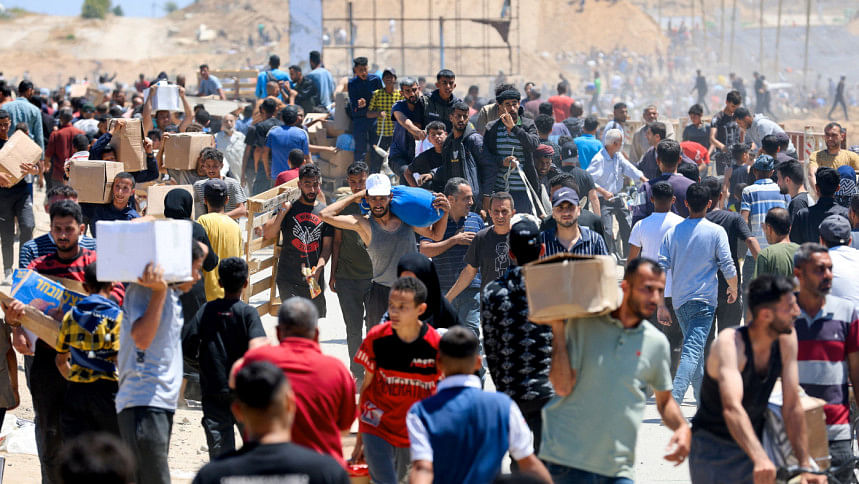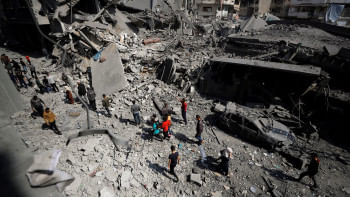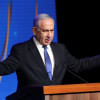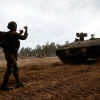The Gaza Humanitarian Foundation and the politics of starvation

The promise of humanitarian aid is simple: to alleviate suffering and uphold human dignity in times of crisis. But in the Gaza Strip, where starvation has been deliberately weaponised, this moral imperative has been grotesquely subverted. The so-called Gaza Humanitarian Foundation (GHF), launched in Delaware in February 2025 as a US-registered non-profit, exemplifies how aid can be co-opted not to nourish, but to manage, surveil, and control a besieged population under the guise of compassion.
Launched with much fanfare and backed by both the Trump administration and the Israeli government, the foundation has been marketed as an "innovative solution" to Gaza's humanitarian catastrophe. But it is widely viewed by critics as a politically engineered instrument designed to bypass the UN, sideline established aid organisations, and normalise a system of military-managed charity. It has, in effect, institutionalised a two-tiered aid regime, one that excludes the most vulnerable while entrenching Israeli control over relief access.
Despite its lofty pronouncements of neutrality, the GHF functions less as a shield against suffering than as an extension of geopolitical strategy. Its convoys are sporadic and heavily surveilled. Its access corridors are negotiated through opaque diplomatic channels. Its food distributions are inconsistent and often restricted to arbitrarily chosen zones. In short, it adapts to the structures of deprivation rather than challenging them.
This distortion is not merely bureaucratic mismanagement; it is the logical outgrowth of a system that instrumentalises humanitarianism. The foundation's silence on the targeting of aid workers, its complicity in the blockade regime, and its calculated vagueness on the conditions of delivery all point to a larger, grimmer truth: starvation in Gaza is not collateral damage—it is a war tactic.
For around 18 years, Gaza has endured an air-tight blockade, punctuated by periodic military incursions and systematic economic strangulation. Basic infrastructure—electricity, clean water, sanitation, healthcare—has been rendered inoperable. In this context, humanitarian aid becomes both lifeline and leash: it keeps people alive just enough to avoid charges of genocide, arguably again, but not enough to allow autonomy or dignity. What emerges is a logic of containment, not relief.
This is biopolitics at its starkest: life reduced to metrics, nutrition calibrated to the bare minimum, human needs treated as logistical problems. The Gaza Humanitarian Foundation is embedded in this regime of control. It decides who eats, when, and how much—not based on humanitarian need, but on political expediency. And when thousands of starving Palestinians frantically converge on the few permitted distribution points, many are gunned down under the pretext that they pose a threat to Israeli forces lying in wait. Hunger is not merely mismanaged, it is weaponised into a site of systematic killing of the most vulnerable, day in and day out, with perfect impunity.
The humanitarian corridors often touted as breakthroughs are in fact chokepoints—points of high-visibility theatre that create the illusion of access. Aid is allowed through in trickles, often after long delays, while images of children queuing with empty containers are circulated for donor sympathy. The performance of care masks the absence of justice.
Worse still, the media spectacle surrounding aid reinforces this illusion. Journalists embedded with convoys document scenes of gratitude and desperation that flood global news cycles, offering a comforting narrative of compassion in action. But these images omit the bombed bakeries, the destroyed farmlands, the flattened water pipelines—the infrastructures of self-sufficiency deliberately dismantled to manufacture dependency.
The GHF, then, is not just about food. It is about narrative. It constructs a story in which humanitarian need is managed with benevolence, in which the international community is active, and in which starvation is framed as an unfortunate consequence of war rather than a deliberate strategy. This story is false, but it is effective. And therefore, it endures.
The rhetorical palette used by the GHF and its backers is thick with euphemism. "Humanitarian pause," "emergency access," "de-escalation"—these terms sanitise a brutal reality. They suggest temporariness where there is permanence, balance where there is asymmetry, and neutrality where there is complicity. They rebrand war crimes as coordination challenges.
To be clear: the aid regime in Gaza is not about alleviating suffering. It is about managing the optics of suffering. It is designed less to deliver hope than to delay collapse, to ensure that Gaza's humanitarian crisis remains contained, choreographed, and, above all, deniable.
This allows the international community to outsource its conscience. By funding a nominal humanitarian response, powerful states can claim moral high ground while continuing to support or enable the political architecture of occupation. The root causes of Gaza's devastation—military blockade, territorial fragmentation, economic strangulation—are buried under spreadsheets, logistics plans, and press releases.
The ethical failure is profound. Humanitarian aid, by definition, is supposed to be impartial, independent, and based on need. But in Gaza, these principles have been eroded beyond recognition. Aid has become anti-political, refusing to name the aggressor, refusing to call out hunger as a weapon, refusing to demand accountability. This silence is not neutrality; it is complicity.
Some may argue that imperfect aid is better than none. But in Gaza, the calculus is different. The humanitarian apparatus is now so tightly woven into the logic of the siege that it risks sustaining the very crisis it claims to alleviate. The more efficient the aid delivery, the more durable the blockade. The more visible the convoys, the more invisible the causes of suffering.
This is the paradox of humanitarianism in Gaza: its presence legitimises the conditions that necessitate it. The GHF's very existence allows Israel and its allies to point to "international cooperation" while continuing policies that dismantle livelihoods, destroy infrastructure, and restrict movement. It becomes not a challenge to injustice, but its mask.
So what is to be done?
First, there must be an honest reckoning with the political economy of humanitarian aid. Foundations operating within siege conditions must be held accountable not only for what they deliver, but for the structures they sustain. An aid convoy that passes through a checkpoint controlled by the same forces besieging a population is not neutral, it is implicated.
Second, the language of humanitarianism must be reclaimed. If starvation is weaponised, it must be named—not as a supply-chain issue, but as a war crime. Aid organisations must abandon the fiction that suffering in Gaza is apolitical. They must speak truth to power, even if it means losing access or funding.
Finally, solidarity must replace charity. True humanitarianism in Gaza cannot be divorced from political advocacy. Aid must be linked to justice, not mere survival. That means supporting efforts to lift the blockade, demanding accountability for war crimes, and affirming the Palestinians' right to live—not just without hunger, but with dignity, security, and freedom.
What we are witnessing in Gaza is not merely a humanitarian crisis. It is the collapse of humanitarianism's ethical core. If this term is to retain any meaning, it must reject complicity in the politics of starvation. It must speak not only in calories and metrics, but in moral clarity and political courage. Until that shift occurs, the Gaza Humanitarian Foundation will remain a symbol not of compassion but of betrayal, indelibly etched in history.
Dr Faridul Alam is a retired academic who writes from New York, US.
Views expressed in this article are the author's own.
Follow The Daily Star Opinion on Facebook for the latest opinions, commentaries and analyses by experts and professionals. To contribute your article or letter to The Daily Star Opinion, see our guidelines for submission.

 For all latest news, follow The Daily Star's Google News channel.
For all latest news, follow The Daily Star's Google News channel. 












Comments